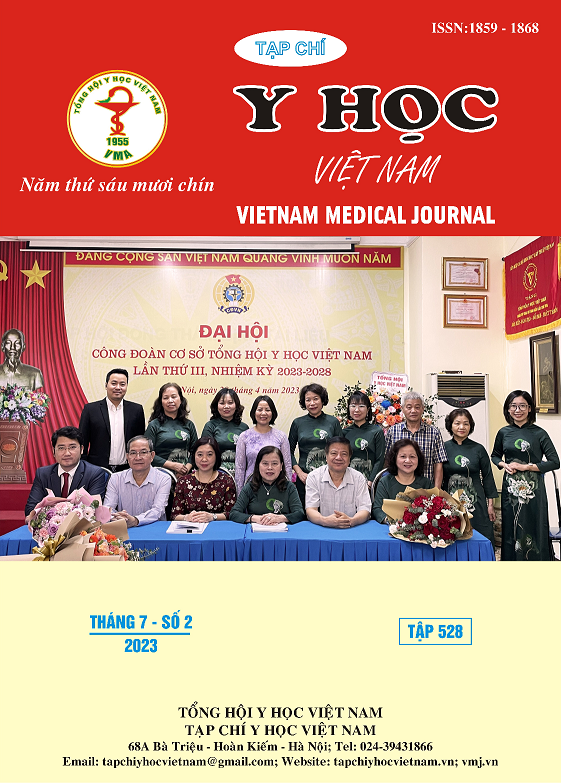STRESS AND SLEEP QUALITY STATUS OF FRONTLINE HEALTHCARE WORKERS PARTICIPATING IN FIGHTING THE COVID 19 EPIDEMIC IN HO CHI MINH CITY
Main Article Content
Abstract
Objectives: To describe mental stress status and sleep quality of frontline healthcare workers participating in fighting the COVID 19 epidemic in Ho Chi Minh city. Subjects and methods: Cross-sectional description frontline healthcare workers who participate in treatment, taking care of COVID 19 patients in Ho Chi Minh City from September 2021 to September 2022 Results: In our research, the number of male and female were equal (50,1% in compared with 49,9%), the majority of medical staffs were doctors (45,2%) and nurses (38,7%). Those with more than 10 years of experience were account for the highest percentage (28,8%). Most of them were vaccinated 2 times with COVID 19 vaccine (98,8%), with the duration more than 4 weeks (89,9%). The majority of medical staffs sent to fight the epidemic were trained and mentally prepared beforehand, with intermate degree respectively 56% and 50,3%. 76% of medical staffs witnessed 1 death or more in their shift. Many individuals were worried that they would be infected by the disease, 41,8% were always worried of infecting COVID 19 to their roommate and relatives. 82,7% found the work to be overwhelming. 62,5% of them got bad quality sleep Conclusion: Most of frontline healthcare workers serving in fighting COVID 19 epidemic were doctors and nurses. There were preparation in knowledge, mental and vaccination beforehand, however not at high efficiency. Frontline healthcare workers faced tremendous stress during their working time due to fear of getting infected, infecting their relatives, having lack of connection to their families and getting burn-out during work, showing through reduced sleep quality.
Article Details
Keywords
frontline healthcare workers, stress, sleep quality, Covid 19 epidemic.
References
2. The Mental Health of Healthcare Workers in COVID-19. Mental Health America. Published January 6, 2023. Accessed January 6, 2023. https://mhanational.org/mental-health-healthcare-workers-covid-19
3. Lan VTH, Dzung LT, Quyen BTT, et al. Impact of Central Quarantine Inside a Lockdown Hospital Due to COVID-19 Pandemic on Psychological Disorders among Health Care Staffs in Central Hospitals of Hanoi, Vietnam, 2020. Health Serv Insights. 2021;14:1178632921999662. doi:10.1177/1178632921999662
4. Vu DN, Phan DT, Nguyen HC, et al. Impacts of Digital Healthy Diet Literacy and Healthy Eating Behavior on Fear of COVID-19, Changes in Mental Health, and Health-Related Quality of Life among Front-Line Health Care Workers. Nutrients. 2021;13(8):2656. doi:10.3390/nu13082656
5. Hoang NA, Van Hoang N, Quach HL, et al. Assessing the mental effects of COVID-19-related work on depression among community health workers in Vietnam. Hum Resour Health. 2022;20(1):64. doi:10.1186/s12960-022-00760-x
6. Mosheva M, Gross R, Hertz‐Palmor N, et al. The association between witnessing patient death and mental health outcomes in frontline COVID‐19 healthcare workers. Depress Anxiety. 2021;38(4):468-479. doi:10.1002/da.23140
7. Moore DM, Gilbert M, Saunders S, Bryce E, Yassi A. Occupational Health and Infection Control Practices Related to Severe Acute Respiratory Syndrome: Health Care Worker Perceptions. AAOHN Journal. 2005;53(6):257-266. doi:10.1177/216507990505300606
8. Biber J, Ranes B, Lawrence S, et al. Mental health impact on healthcare workers due to the COVID-19 pandemic: a U.S. cross-sectional survey study. Journal of Patient-Reported Outcomes. 2022;6(1):63. doi:10.1186/s41687-022-00467-6


